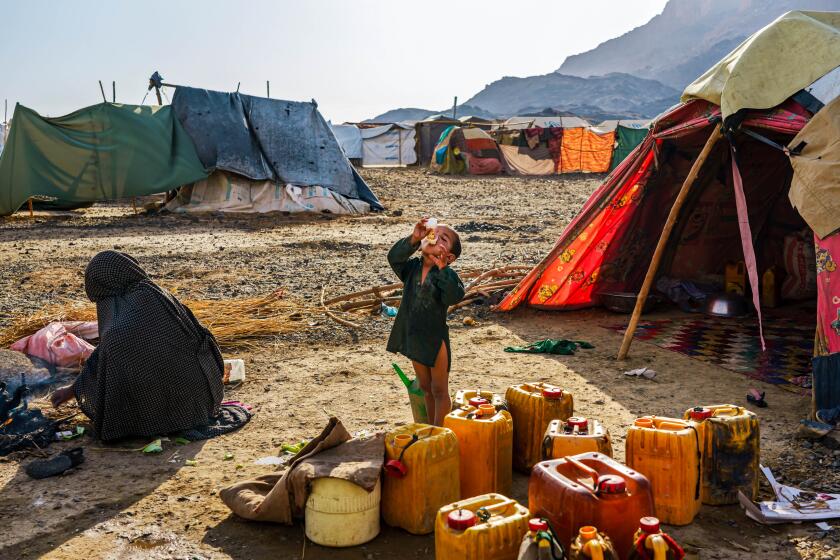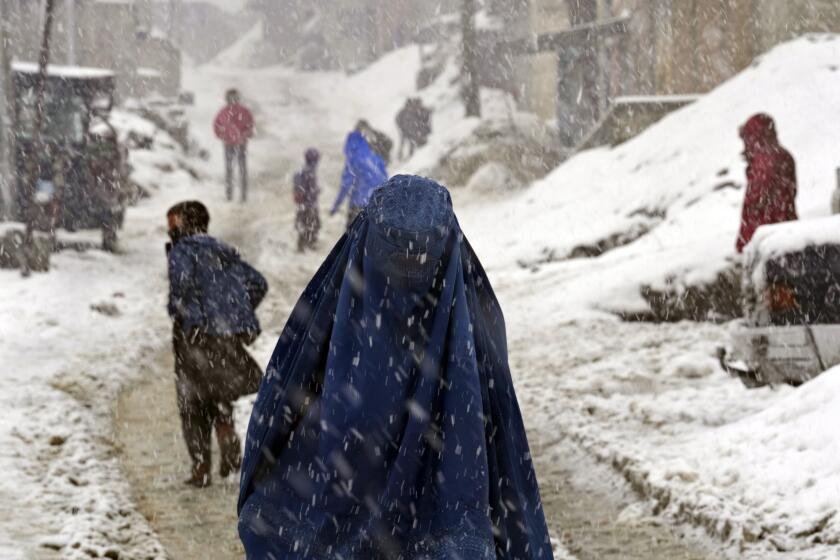U.N. food agency official alarmed by Afghan food and fuel prices

- Share via
KABUL, Afghanistan — An official with the U.N. food agency warned Friday that with Russia’s war in Ukraine taking an increasing toll on the global economy, the ripples of that conflict will further increase food and fuel prices in the desperately poor Afghanistan.
Since the Taliban takeover in mid-August, Afghanistan has been sinking deeper into poverty and economic crisis. As many as 95% of the country’s 38 million people don’t have enough to eat or money to buy the food.
Shelley Thakral, a spokeswoman for the World Food Program, said that food prices in Afghanistan rose nearly 40% over the last eight months. The WFP has spent $1 billion feeding millions of Afghans this year but needs another $1.6 billion, Thakral added.
“The worrying thing, I think, and this includes Afghanistan as well as all the other hunger spots across the world, is the rise in food and fuel prices,” Thakral said.
So far, donor countries have not sidelined Afghanistan but she said they “have to dig deeper” as Europe deals with the shockwaves of the war and the 3.2 million refugees who have fled Ukraine since Russia launched its invasion Feb. 24.
Thakral’s remarks echoed those of U.N. refugee chief Filippo Grandi, who warned during a visit to Kabul on Tuesday that the war in Ukraine could siphon off money from humanitarian crises elsewhere, including in Afghanistan, and that soaring food prices could cripple humanitarian efforts.
The United Nations chief warns that millions of Afghans are in grave danger because of freezing temperatures and frozen assets abroad.
Although most of Afghanistan’s wheat supplies come from Kazakhstan and Uzbekistan, Thakral said the increasing food and fuel cost as a result of the war could add up to 20% to the costs of providing humanitarian assistance.
When the Taliban swept to power, international donor money, which paid more than 80% of Afghanistan’s bills, dried up and the country’s economy went into free fall.
There was food on Kabul markets on Friday, but Masihullah, standing by his small grocery stall, said no one has money. Most people don’t have jobs, Masihullah said. Like many Afghan men, he uses only one name.
The Biden administration is seeking to assure financial institutions and other businesses that U.S. sanctions on the Taliban aren’t intended to interfere with trade that could help Afghanistan emerge from an economic and humanitarian crisis.
A sack of flour costs nearly $28, and most Afghans are now below the poverty line, which means they earn $1.90 a day or less.
Thakral said 80% of Afghans are in debt because they have had to borrow to pay for food or medicines, and even working Afghans look to the WFP for aid because they don’t make enough to afford the food on the market.
A Human Rights Watch report released Thursday said that since January, about 13,000 newborns have died from malnutrition and hunger-related diseases in Afghanistan and 3.5 million children need nutritional support.
“If the countries we import food from face a challenge, we face a challenge,” said Masihullah. “There is war between Russia and Ukraine, so we are affected. ... There is a high increase in prices of oil and wheat.”
A U.K. pledging summit later this month expects to raise $4.4 billion to stave off a worsening humanitarian crisis in Afghanistan, Thakral said.
“Right now in Afghanistan, what we need to sustain is the attention on the people here,” she said.
More to Read
Sign up for Essential California
The most important California stories and recommendations in your inbox every morning.
You may occasionally receive promotional content from the Los Angeles Times.












